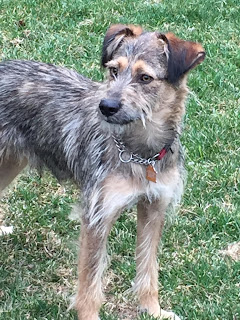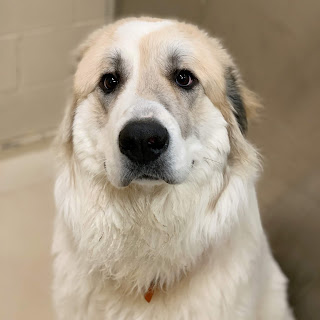A Mutt by Any Other Name
At the Cochrane & Area Humane Society we specialize in mutts; dogs that do not belong to one officially recognized breed and are not the result of intentional breeding. There are an estimated 150 million mutts worldwide and many have no known purebred ancestors. This describes a large percentage of the dogs that come through our doors. In addition, many of our dogs arrive as strays, so even if they know their lineage, they're not talking. As a result, the majority of our adoptable canines are labeled as mixed breed since identifying a predominant breed or even a breed mix would be a guess and visual breed identification in dogs is unreliable. One person's Plott Hound is another person's Treeing Tennessee Brindle. For a small shelter in Western Canada, we have had an inordinate amount of Louisiana Catahoula Leopard dogs thanks to a spotted coat, Google and some staff creativity. In a recent study 87.5% of dogs ID’d by shelter staff as a certain breed didn’t actually have those breeds by DNA analysis, so does speculating on breeds make for successful adoptions?
One of the most frequent questions we are asked about our dogs is what breed they are. Our staff are trained to answer honestly and the majority of the time that means saying we don't know. Typically the follow-up question is what do you think it is? That's when you see us deflect, sidestep and try to convince you that we really don't know, really! The truth is that less than 1% of a dog's genes determine physical appearance. Plus knowing a dog’s breed mix won’t help us determine behaviour because the behaviour of all dogs is influenced by a variety of factors – I have had 3 purebred Golden Retrievers and while they shared some traits, like shedding excessive amounts of hair, they each had very distinct personalities.
A downside of breed labeling is that it can also negatively affect dogs finding homes. Potential adopters can be deterred by preconceived notions or breed biases regarding traits associated with specific breeds, maybe they had a negative experience with an exuberant Labrador Retriever as a child. By labeling a specific breed without knowledge we could be narrowing the number of potential homes for that animal and increase his/her length of stay in the shelter. We could also be setting unrealistic expectations based on someone's knowledge of breed traits. Imagine looking for a calm dog and we guess it's a Newfoundlander cross and it turns out to be part Border Collie and is herding the children and requires 5 walks a day!
By removing breed, we hope to shift the conversation toward the individual dog and his/her suitability for a potential adopter – life style, exercise requirements, etc. We would prefer that you are able to select your new companion by considering each dog’s individual personality and qualities instead of relying on a breed label that is only a guess. Get to know the dog in front of you and fall in love with a mutt!
 |
| Homer is 12.5 % Labrador Retriever, 12.5% German Shepherd & 75% mixed breed |
One of the most frequent questions we are asked about our dogs is what breed they are. Our staff are trained to answer honestly and the majority of the time that means saying we don't know. Typically the follow-up question is what do you think it is? That's when you see us deflect, sidestep and try to convince you that we really don't know, really! The truth is that less than 1% of a dog's genes determine physical appearance. Plus knowing a dog’s breed mix won’t help us determine behaviour because the behaviour of all dogs is influenced by a variety of factors – I have had 3 purebred Golden Retrievers and while they shared some traits, like shedding excessive amounts of hair, they each had very distinct personalities.
 |
| Taffy is 25% American Bulldog, 12.5% German Shepherd, 12.5% Akita & 50% mixed breed |
A downside of breed labeling is that it can also negatively affect dogs finding homes. Potential adopters can be deterred by preconceived notions or breed biases regarding traits associated with specific breeds, maybe they had a negative experience with an exuberant Labrador Retriever as a child. By labeling a specific breed without knowledge we could be narrowing the number of potential homes for that animal and increase his/her length of stay in the shelter. We could also be setting unrealistic expectations based on someone's knowledge of breed traits. Imagine looking for a calm dog and we guess it's a Newfoundlander cross and it turns out to be part Border Collie and is herding the children and requires 5 walks a day!
 |
| Sadie is 25% Brussels Griffon, 12.5% Pekingese, 12.5% Golden Retriever & 50% mixed breed. |
By removing breed, we hope to shift the conversation toward the individual dog and his/her suitability for a potential adopter – life style, exercise requirements, etc. We would prefer that you are able to select your new companion by considering each dog’s individual personality and qualities instead of relying on a breed label that is only a guess. Get to know the dog in front of you and fall in love with a mutt!


Comments
Post a Comment